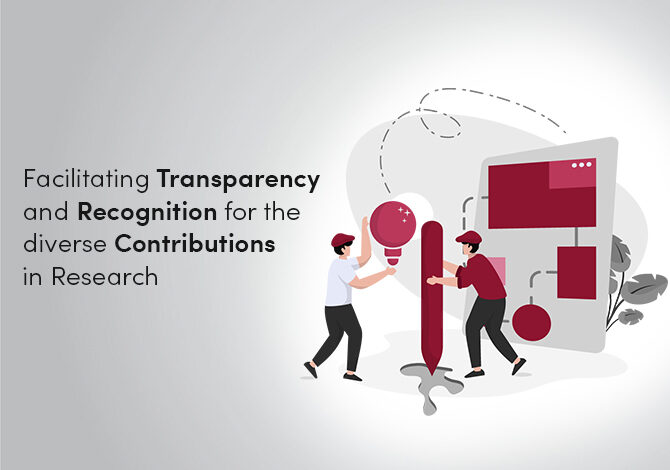Most research projects today include multiple contributions from groups of collaborators. These contributions range from the formulation of ideas and the acquisition of funds to the usage of software and curation of data. A lot of work goes on behind the scenes, for example, in peer review or project administration processes. However, the lack of recognition of specific contributions by individuals is a key challenge to their participation in a large science team, as per a recently updated report from a working group established by the Academy of Medical Sciences. If given recognition for specific contributions, researchers can gain more visibility and receive more appropriate acknowledgement for their work.
Conventional methods for communicating contributorship can be confusing. For example, the relevance of author-order in the author list is inconsistent from journal to journal and across disciplines. Also, the inclusion of some contributors in acknowledgements means that some significant contributions do not get the right kind of recognition. This sort of inconsistent methodology can be problematic for systems that perform text and data mining, which means that it is difficult for automated processes to accurately identify authorship.
The authorship model may be outdated and consequently unsuccessful at conveying the full scope of a named individual’s specific contributions. On the other hand, the concept of contributorship supports the ability to clarify an individual’s specific contributions, which is relevant to science in a world where transparency, collaboration, and open science is becoming the norm, and in some cases, the requirement.
The Open Researcher and Contributor ID (ORCID) is partially helpful in identifying author and contributor credentials. ORCID is a global, community-built, non-profit organization that issues unique persistent identifiers. An ORCID identifier is created and maintained by the individual contributor and is free of charge. Information, such as publications and other works, is uploaded to ORCID by publishers and other entities, and those works are then claimed by the individual.
Another community-built initiative working towards the shared goal of creating greater transparency and recognition for research contributions is the Contributor Roles Taxonomy (CRediT). CRediT is a high-level taxonomy developed in 2014 and shortly introduced into mainstream journal workflow systems around 2015. More than 50 organizations have implemented it to support their diverse contributors. Since its standardization as a NISO standard, its adoption has increased.
By adopting CRediT, publishers can help journals provide transparency and recognition for the diverse contributions made in research collaboration. Using and sharing CRediT information in published works helps to promote integrity in scientific publication. HighWire Press integrated CRediT into our journal hosting platform in 2020, allowing publisher partners to leverage CRediT to encode contribution information inside article XML in compliance with the most recent versions of JATS XML. Read how to use CRediT in JATS XML versions 1.2 forward here: https://jats4r.org/credit-taxonomy.
Over a year ago, ORCID extended its support for CRediT by enabling ORCID users to add and display CRediT roles per manuscript entry in ORCID records. This can be automated via integrated services. We are now able to catch glimpses of the movement towards open science through progress being made on these initiatives.
The latest to join this movement is UK Research and Innovation (UKRI), a national funding agency. The UKRI encourages its researchers to use standardized Persistent Identifiers (PIDs) for articles, unique PIDs (like ORCID IDs) for research management information, and article-level metadata. The UKRI recently updated its Open Access Policy, focusing on the need for funders and organizations to track scientists’ careers data, as well as the need to maximize discovery and interoperability of their funded research outputs.
This indicates that the scholarly community is keen to involve itself in initiatives intended to promote open research and open science. What are your thoughts about crediting all research contributions?
Share your thoughts here, or set a time to chat with our team of experts.



